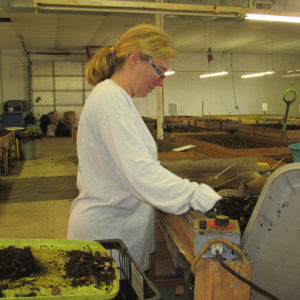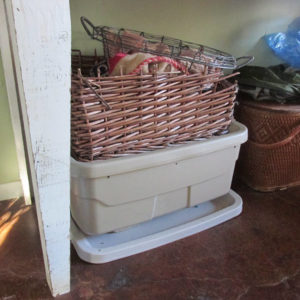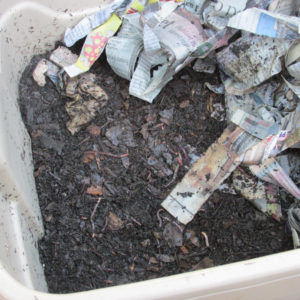Vermicompost: Black Gold for the Garden
By Anne-Marie Miller (Dash)
Just recently I had the pleasure of interviewing Heather, the main worm wrangler at her business, The Texas Worm Ranch. At the ranch, wooden beds fill the expansive warehouse space containing worms in various stages of life. She not only raises worms to help people get started with vermicomposting but also sells “black gold,” AKA earthworm castings. Turns out this stuff is VERY beneficial for the plants growing in your garden. Think of it as the ultimate natural superfood for your plants. Heather educated me about earthworm castings. This is what she had to say:

“While there are nutrients in worm castings, the real benefit to worm castings are the millions of beneficial microbes that are present in them. Those microbes eat organic matter in your soil and release plant-available nutrients. Fungi in the castings form symbiotic relationships to transport water and nutrients to the roots. Fungi can hold water in the soil and help with water management. Worm castings will have at least 10 times more microbes than soil or regular compost.”
I have been learning a lot about gut health lately. It seems it is VERY important to have the right mix of beneficial bacteria and yeast in your gut to help make the food nutrients available to your body. I guess the same goes for the beneficial microbes in the soil to make the nutrients available to the plants. Well the proof is in the pudding, so to speak. I feel an experiment coming on. You guys know how much I love those! I am thinking a tray of seedlings with worm castings and one without. Or, along the same lines, two whole garden beds of the same plantings to compare one bed with earth worm castings and one without. I will do it and let you know just how great this superfood is!
Heather and I hit it off right away as we both had similar reasons for getting started with gardening: Our families. When your children start to have health problems you start to look at what you are eating, because frankly it is one of the only things you can control in the whole equation. Turns out mama’s instincts might be right on track. People are finding out that eating fresh, organic food makes a big difference in not only how you feel right away, but long term overall health. Another thing we had in common is that we started a worm bin right about the same time in our lives. This is where our paths divide. While I failed miserably with my bin (turned into a soupy, stinky mess) she succeeded and was so impressed with the outcome (worm poop) that she turned it into a thriving business. I know! Why couldn’t that be me? This time, with Heather’s help, I think I can succeed at this worm castings thing and I think you can too.

With the memory of my stinky bin from the past, the first question I asked was, “Can I have it outside?” Bad news is that these red wigglers like a temperate climate just like we do, so I am stuck with worms inside my house. However, those of you that know me well already know that I have mealworms over my dryer, so this is not really a huge leap for me. LOL!
The good news is Heather promised me that, if done properly, the bin should NOT smell and, in fact, no one will even be aware that it is present. I, of course, had to test her on this so was very sneaky in placing my bin in my dining room under my hutch. I honestly still don’t think my family has noticed it yet. Score for me!
Let’s start with how to set up the vermicomposting bin. You will need a 10-gallon plastic storage bin with drainage: 1/4” holes drilled on the bottom 4 corners and around the top spaced every 4 inches. Then you will need to, of course, purchase worms—not just any worm, but the red wriggler worm. Long ago when I first started my bin, frankly, I was too clueless and too cheap to buy worms, so I dug my own to start my bin. As I have stated, this did not go well. First of all, the worms I got were deep diggers designed to aerate our heavy clay soil. In contrast, red wigglers love to live on the top few inches of the leaf-strewn forest floor, turning those leaves into good fertile soil. Note to self: All worms are NOT created equal. So don’t dig them, don’t stop by your local bait store to pick some up. Get them from someone who runs a worm ranch!

My next hurdle to jump was that “the worm wrangler” had just told me to put drainage holes in the bottom of my bin AND keep it inside. O.K. I don’t know about you, but the words drainage holes and inside don’t really go together in the same sentence. Get ready for the next kernel of wisdom: Don’t make it too wet or feed them too often. To start off your bin, you will want to put a layer of compost on the bottom covered with DAMP newspaper strips on top.
Putting your bin up on bricks with a plastic lid under it is a good idea to provide aeration, not really to catch drips. If you have done your bin right, you should NOT have drainage coming out the bottom.
It is in the in-between layer that you will feed your worms. They only need to be fed about every 4 days, and just a handful each time. I have to confess here that my first bin I viewed as a garbage recycler. You can be sure I fed these worms WAY more than a handful every 4 or 5 days. That, the wrong worms, and having WAY too much water to start with = the soupy stinky mess I got. This new way will work out well because back then I only had my worm bin to dispose of my scraps. Now I have chickens, rabbits, mealworms, black soldier flies and compost. When all is said and done there will only be a handful left! Interestingly enough, she gets her main supply of worm food from a juice bar company. If you juice your veggies this would be the perfect food to throw to the worms. So, to put it plainly, there really should not be any “drainage to worry about,” but a bit of cardboard or plastic lid under your bin with bricks lifting it up could be good, just in case.
Alright, now I have my bin all set up and working incognito very well, but what I am interested in is this “black gold.” Check back to see the best way to harvest this nourishing addition to your garden and how to use it. In the meantime, get started with this great addition to the homestead. You have to love it when something turns your food scraps into superfood while you go about your life! The Texas Worm Ranch has everything to get you started.
If you are just NOT open to having worms in your house, that is OK—I think I am a little on the odd side to embrace insects like I do. In that case, the Texas Worm Ranch has worm castings or “black gold” you can buy. Heather brought up an interesting point—that the buyer has to be aware of unscrupulous dealers of “black gold.” Meaning that a lot of companies can sell their product for a cheaper price by feeding a cheaper feed. That cheaper feed is oftentimes peat moss. This produces a product which looks like black gold but is actually nutrient deficient and will NOT have the same results in your garden. Heather was a bit more Brainiac than me and seemed like she had delved deep into soil micro biology, going so far as to send casting samples off to the lab to make sure they are delivering the quality product that they claim. Also, she felt strongly about providing her workers with a living wage which we know doesn’t happen everywhere. So if you find cheap “black gold” somewhere, it might not be “gold” at all.
 Anne-Marie (Dash for short) is an Urban Farmer in Dallas, Texas. She tested the-in-the-box thinking of the city she lives in by creating a front yard garden. She chases chickens, rabbits and children on her urban homestead. Follow along with her homesteading adventures on her blog: bloomwhereyourplanted.com. Here she will challenge you to stop pining for the country and Bloom Where You’re Planted!
Anne-Marie (Dash for short) is an Urban Farmer in Dallas, Texas. She tested the-in-the-box thinking of the city she lives in by creating a front yard garden. She chases chickens, rabbits and children on her urban homestead. Follow along with her homesteading adventures on her blog: bloomwhereyourplanted.com. Here she will challenge you to stop pining for the country and Bloom Where You’re Planted!







My wife and I have been using worms in our composter’s for many years now. We have found that when we use this compost in every hole we dig in which we plant our food source the plants do so much better than when we didn’t do this. Also, the food that comes from these plants is noticeably tastier by far!
I haven’t gotten brave enough to start vermicomposting on my own, but I’ve bought vermicompost from a local company for my garden for about three years now, and that stuff really is black gold. I had more tomatoes on the vine last year than I could even fathom. I was a big believer in chemicals for years (until I started reading stuff like this: http://www.goodsweetearth.com/yard–garden-blog/so-whats-in-your-soil), and I was sorta worried that going organic wouldn’t produce the same results as the chemicals could. But I was wrong!
good luck with the wormies!! You are gonna love the compost they make!!
Used to have vermicompost bin in living room closet. Never a smell, no one realized it was there. Loved to show it off. Great compost and I loved my worms.
I called your customer assistance number at 10 pm and was assisted by Sarah. She comprehended my question and resolved my situation clearly and promptly. Thank you
To deal with any drainage, I nest my main worm box in another box of the same size. It sits maybe a quarter to half an inch above the bottom box. Works very well. And right now, I have a second little family of worms in the bottom box.